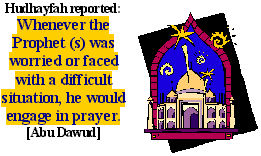Tauhid ( Islamic Monotheism ) has three aspects : (A) Oneness of the Lordship of Allah ; Tauhid-ar-Rububiyah : To believe that there is only one Lord for all the universe its Creator, Organizer, Planner, Sustainer, and the Giver of security, etc., and that is Allah. (B) Oneness of the Worship of Allah ; Tauhid-al-Uluhiya : To believe that none has the right to be worshiped [ e.g. praying, invoking, asking for help (from the unseen), swearing, slaughtering sacrifices, giving charity, fasting, pilgrimage, etc. ] but Allah. (C) Oneness of the Names and the Qualities of Allah ; Tauhid-al-Asma was-Sifat : To believe that : (i) We must not name or qualify Allah except with what He or His Messenger, Muhammad (peace be upon him), has named or qualified Him, (ii) None can be named or qualified with the Names or Qualifications of Allah ; e.g. AL-Kareem, (iii) We must confirm all of Allah's Qualification which Allah has stated in His Book (the Qur'an) or mentioned throuhg His Messenger ( Muhammad ) without changing them or ignoring them completely or twisting the meanings or giving resemblance to any of the craeted things [ e.g. Allah is present over His Throne as mentioned in the Qur'an (20:5) :- " The Most Beneficent (Allah) Istawa (rose over) the (Mighty) Throne " over the seventh heaven ; and He only comes down over the first (nearest) heaven to us on the day of Arafat (the 9th of Dhul-Hijja), and also during the last third part of the night as mentioned by the Prophet Muhammad (peace be upon him), but He is with us by His Knowledge only, not by His Personal-Self (Bi-Dhatihi). Also Allah said : " There is nothing like unto Him and He is the All-Hearer, the All-Seer " (42:11) This holy Verse confirms the quality of hearing and the quality of sight for Allah without resemblance to others, and likewise He also said : " To one whom I have created with Both My Hands," (38:75) " The Hand of Allah is over their hands " (48:10) This confirms two Hands for Allah, but there is no similarity for them. This is the Faith of all true believers, and was the Faith of all the Prophets of Allah, from Noah, Abraham, Moses, and Christ till the last of the Prophets , Muhammad (peace be upon them all) . [ It is not like as some people think that Allah is present everywhere--here, there and even inside the braests of men ] . # These three aspects of TAUHID are included in the meaning of La ilaha ill-Allah ( none has the right to be worshiped but Allah ) . # It is also essential to follow Allah's Messenger, Muhammad (peace be upon him) : Wajub al-Itteba'a and it is a part of Tauhid-al-Uluhiyah . This is included in the meaning, " I testify that Muhammad (peace be upon him) is Allah's Messenger," and this means, " None has the right to be followed after Allah's Book (the Qur'an), but Allah's Messenger Muhammad (peace be upon him)," . Allah said : " And whatsoever the Messenger ( Muhammad) gives you, take it, and whatsoever he forbids you, abstain from it " (59:7) . " Say ( O Muhammad to mankind ), If you (really) love Allah then follow me [ i.e. accept Islamic Monotheism, follow the Qur'an and the Sunnah (legal ways of the prophet Muhammad peace be upon him), ], Allah will love you and forgive you of your sins. " (3:31) .
Definitions of Islamic Monotheism (Tauhid)
Posted by
Unknown
0
comments
Some Hadiths (Traditions) of Islam
Posted by
Unknown
0
comments
The noble conduct and the sayings of the Prophet(s) have been a perpetual source of inspiration and guidance for mankind, in general, and the believers, in particular. The former is known as the Sunnah and the latter asHadith. They inspire us to purify our faith and to sanctify our conduct. At the same time, they instruct us to live a clean and virtuous life. Following these commednable teachings will bring peace and tranquillity to our lives and simultaneously help us to acquire Allah's blessings and bounties. (M. Kazi)
Hadith are thus the sayings, doings and approvals of the prophet Muhammad (peace be upon Him) as related and recorded meticiously by his companions that lived with him. The following translations are taken from a very nice hadith book called "A Treasury of Hadith" compiled by Dr. Mazhar U. Kazi or from Summarized Sahih Al-Bukhari translated by Dr. Muhammad Muhsin Khan . All these hadith located throughout this website are from the most authentic sources in Islam.
Subscribe to:
Comments (Atom)
























































.gif)


